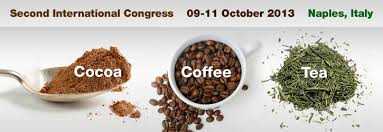Martínez-López S., Sarriá B.,Mateos R., Bravo L. Department ofMetabolism and Nutrition, Institute of Food Science, Technology andNutrition (ICTAN), Spanish National Research Council (CSIC), Madrid, Spain. E-mail: lbravo@ictan.csic.es
Coffee is among the most common beverages consumed in Europe and USA. Beneficial health effects have been attributed to its polyphenolic composition in addition to its stimulant properties. Green coffee is richer in antioxidant phenols, and could be considered a healthier alternative to traditional roasted coffee.
A crossover, randomized, double-blind, controlled study has been carried out in healthy and hypercholesterolemic humans (n=52, being 25 normocholesterolemic (NC) and 27 hypercholesterolemics (HC)), aged 18-45, non-smoker, non-vegetarian men and women, with BMI 18-25 kg/m2.
The effects of consuming three servings per day of soluble green coffee in water during 8 weeks were comparatively studied with not-consuming any coffee or coffee derivative during the same time.
Along the whole study polyphenol rich foodswere restricted. At the beginning and the end of both interventions, urine and blood samples were collected.Plasma and serum was separated and total cholesterol (TC), HDL-C and LDL-C were analyzed. Antioxidant capacity in serum was measured by FRAP [1] and ORAC [2] methods. Lipid oxidation was determinedby measuringmalondialdehyde(MDA) levels in serum [3].
Heart rateand diastolic and systolic pressure were also evaluated.Results were statistically studied using a mix model with repeated measures and a Bonferroni test within each group.
After the green coffee intervention, lower values of heart rate and blood pressure were observed, as well as a slight decrease of TC and LDL-C,andan increase of HDL-C in both intervention groups. FRAP levelsincreased in NC group (p=0.006) after coffee intervention.
ORAC increasedin the NC and HC groups (p<0.001 and p=0.006, respectively);in agreement with this, the paired test showedthat ORAC valued increased in the normo(p=0.012) and hypercholesterolemic (p=0.008) groups. Similarly, MDA values showed statistically significative differences in NC (p=0.010) and HC (p=0.007) groups.
It can be concluded that regular consumption of green coffee improvesbiomarkers related to cardiovascular health. Funded by AGL2010-18269 and CSD2007-00063.Approved by Ethics Committee of Hospital Puerta de Hierro (Madrid).
References [1] Benzie, I. et al. The Ferric Reducing Ability of Plasma (FRAP) as measure of ‘‘Antioxidant Power’’: The FRAP Assay. Analytical Biochem.1996, 239, 70-76.
[2] Huang, D. et al. High-throughput assay of Oxygen Radical Absorbance Capacity (ORAC) using a multichannel liquid handling system coupled with a microplatefluorescence reader in 96-well format. J Agric Food Chem. 2002, 50, 4437-4444.
[3] Mateos, R. et al. Determination of malondialdehyde (MDA) by high-performance liquid chromatography in serum and liver as a biomarker for oxidative stress: Application to a rat model for hypercholesterolemia and evaluation of the effect of diets rich in phenolic antioxidants from fruits. J Chrom B. 2005, 827, 76-82.
















